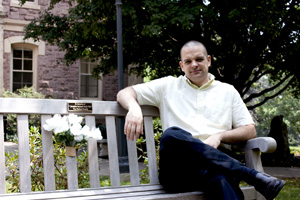While working on his doctoral dissertation at the University of Arizona several years ago, Professor Osvaldo Cleger stumbled upon what would become the topic of his book, Narrar en la era de las blogoficciones [The Art of Narrating in the Age of Blog-Fictions]. He kept a miscellaneous blog in which he chronicled his dissertation research.

Osvaldo Cleger, assistant professor of foreign languages and literatures
When friends and colleagues found out about the blog and began posting comments, he became very interested in how digital platforms like blogs and web pages influence authorship.
“I was amazed by how easy it was to publish a text on the Internet and find sometimes a very large readership without going through the traditional channels of finding an established journal or publisher,” says Cleger, assistant professor of foreign languages and literatures. “At some point, I asked myself what would happen if all these new technologies and possibilities for multimedia, non-linear writing, and instant publishing were applied to literary creation. The day I asked myself that question, my book was born.”
Cleger completed most of his research online, discovering Hispanic authors and artists from Argentina, Spain, Colombia, and Mexico who have been producing works in the electronic literature field since the mid 1990s. A portion of his book focuses on blog-novels written by Argentinean author Hernán Casciari, who Cleger views as an emerging “classic” in the field. The rest of the book presents the theoretical framework to understand digital culture.
The Art of Narrating in the Age of Blog-Fictions, which is being published by Mellen Press, takes an interdisciplinary approach to blogging, presenting blog-fictions as an expression of society in its current state and as a new fictional genre that challenges traditional narrative concepts. Cleger also studies the way bloggers reproduce their social lives on the Internet by creating social networks through texts, hyperlinks, and multimedia artifacts. The book also studies blog structure and defining features.
Cleger’s fascination with blogs has seeped into his classroom at Lafayette. He offered an advanced Spanish seminar, From Hypertext to Blog-fictions: Mapping Current Trends in Electronic Literature, which was a survey of 21st century e-literature. According to Cleger, the course was one of the first of its kind in the country and one of the most rewarding teaching experiences of his career. Several students have already expressed an interest in conducting honors thesis research on the topic. He also is developing an advanced composition class that would allow students to create their own web pages and produce hypertext narrative or flash animation while learning advanced Spanish communication skills.
The implications of e-literature are huge in the higher education environment, says Cleger, who points to a recent New York Times article announcing that e-book sales are outpacing hardcover sales.
“I believe my book is tackling one of the most relevant subjects we can discuss in today’s society, at least from the perspective of a Hispanist who specializes in literary subjects,” he says. “And this relevance is even bigger when we look at the higher education environment, where most of our work–and what most professors still consider ‘literature’–comes in printed books. In my book, ironically written and published in the most traditional way, I show that literary creation is already happening in other electronic formats, and literature is already moving beyond the printed page.”
In addition to digital culture and e-literature, Cleger’s teaching interests include Spanish language courses, Latin American literature from the 18th- 21st centuries, Spanish literature from the 20th and 21st centuries, poetry, interdisciplinary studies, women’s studies, literary theory, and cultural studies. He is the author of 20 book articles, journal articles, and conference papers, receiving the Calendario Award of Literary Criticism for the essay Amor y conocimiento en Cintio Vitier. His creative work also has been included in published volumes of poetry. Cleger joined the Lafayette faculty in 2009. He earned his Ph.D. in Hispanic literature from the University of Arizona, master’s degree from New Mexico State University, and bachelor’s degree from University of Havana.
